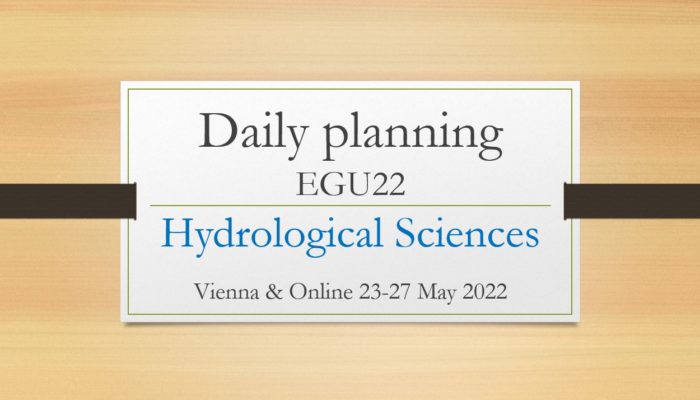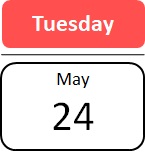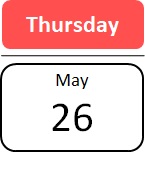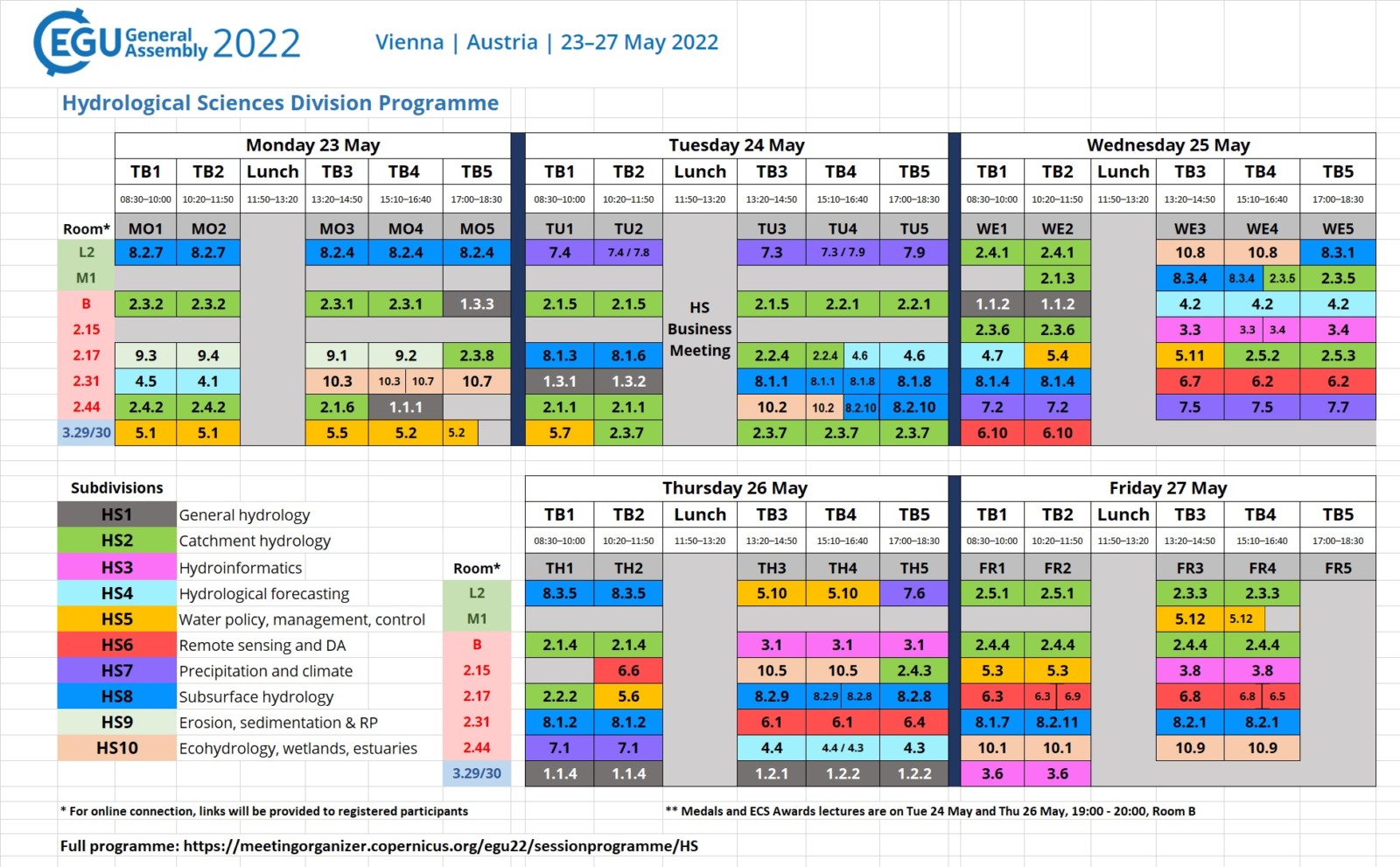
The EGU General Assembly 2022 will take place on 23–27 May 2022, with more than 12,000 presentations that will be delivered and viewed both virtually or on-site in Vienna (Austria Center Vienna).
About 1,900 presentations are included in the 99 scientific sessions that are led by the Hydrological Sciences (HS) Division. The 2022 conference programme is now online, but how do we navigate through this broad choice of things to see?
How to start
First of all, you have to register for the conference! Registration for on-site participation is only possible until 14 April 2022, 13:00 CEST. Online registration can be done at any time.
Then, whether you are planning to attend on-site or online, you need to take a couple of hours to prepare your own schedule for the week. It is time well spent, since it will help you later to get the most out of the conference.
If this is your first time at an EGU General Assembly and, in particular, if you are an Early Career Scientist (ECS), then you should not miss these:
- SC1.1 – How to navigate the EGU: tips and tricks, Mon, 23 May, 10:20–11:50 (CEST), Room -2.61/62
- SC1.2 – How to get involved with EGU, Tue, 24 May, 15:10–16:40 (CEST), Room -2.85/86
If you have not already done so, go through the highlights of the past 20 years of the Hydrological Sciences Division to learn more about our division and how it has evolved over time.
What is in the HS Division programme for 2022?
My advice is to start your daily planning for EGU22 with the Hydrological Sciences programme, of course!
Something not to miss (a meeting point for EGU hydrologists) is our business meeting, where we present what we did in the past year; we say thank you for those officers who are ending their terms; we introduce the new officers, including the recently elected Division president; we vote on the composition of the division’s committees, etc. Just join us:
- HS Division Business Meeting: Tue, 24 May, 12:00–13:00 (CEST), Room B
For the scientific sessions, we have prepared the HS Schedule at a glance (click on image to enlarge):
For details, browse by session here, sorted by sub-divisions. You can start with the HS Division and move on checking the sessions organized by the other EGU divisions to add more to your initial programme.
With the short oral presentations, my guess is that you will have a hard time to move from one session to another (particular if you are attending on-site and the sessions are held in different floors), so another advice: find one session you want to attend per time block (TB) and stick to it, eventually moving from one room to another during coffee/lunch breaks. Some difficult choices will have to be made, but you will probably enjoy more the meeting if you participate in the full discussions of a session (and you can always use the coffee breaks to exchange with other colleagues on what happened there where you were not!).
Each day of the EGU General Assembly is organised in time blocks (TBs), as follows:
Additional sessions for your daily planning
In addition to the HS Division schedule, you might also be interested in the following (see how to access the programme for details):

- GDB1 – Towards an academic evaluation system that celebrates diversity of talent, Mon, 23 May, 10:20–11:50 (CEST), Room E1
- US2 – The role of the geosciences in preserving and restoring biodiversity, Mon, 23 May, 13:20–14:50 (CEST), Room E1
- SC3.6 – Scared of giving presentations?, Mon, 23 May, 13:20–14:50 (CEST), Room -2.85/86
- SC2.6 – How to build and grow your scientific network, Mon, 23 May, 15:10–16:40 (CEST), Room -2.61/62
 Medals & ECS Award Lectures related to hydrology:
Medals & ECS Award Lectures related to hydrology:
-
- MAL1 – Alfred Wegener Medal Lecture by Günter Blöschl, Tue, 24 May, 10:20–11:50 (CEST), Room E1: Understanding changing river flood hazards
- MAL18 – John Dalton Medal Lecture by Martha C. Anderson (On the value of thermal infrared remote sensing for water and land management) & Arne Richter Award for Outstanding ECS Lecture by Niko Wanders (Dry drier drought – Understanding drought in a changing society and climate), Tue, 24 May, 19:00–20:00 (CEST), Room B
Union Symposia and Short Course:
- US3 – The future of (geo)scientific conferences, Tue, 24 May, 13:20–16:40 (CEST), Room E1
- US4 – Scientific neo-colonialism: what is it and why should you care?, Tue, 24 May, 17:00–18:30 (CEST), Room E1
- SC3.7 – Outreach: how to get your science out there?, Tue, 24 May, 17:00–18:30 (CEST), Room -2.85/86

- SC3.2 – The role of scientific institutions in policymaking (on-site only), Wed, 25 May, 08:30–10:00 (CEST), Room -2.61/62
- GDB3 – Great Debate on Open Science, Wed, 25 May, 10:20–11:50 (CEST), Room E1
- ITS2.5/NH10.8 – Artificial Intelligence for Natural Hazard and Disaster Management, Wed, 25 May, 11:05–11:47 (CEST), 13:20–16:36 (CEST), Room N1
- ITS3.2/HS1.1.8 – Socio-Hydrogeology: a transdisciplinary approach to groundwater science, Wed, 25 May, 17:00–18:30 (CEST), Room N1

More Medal & ECS Award Lectures for Hydrological Sciences:
-
- MAL15 – Henry Darcy Medal Lecture by Wouter Buytaert (Local solutions for global water security) & HS Division Outstanding ECS Award Lecture by Manuela I. Brunner (Floods and droughts: a multivariate perspective on hazard estimation), Thu, 26 May, 19:00–20:00 (CEST), Room B
Union sessions and Short Courses:
- US1 – Changing the Faces of Leadership at the Geoscience – Policy Interface, Thu, 26 May, 15:10–16:40 (CEST), Room E1
- GDB5 – Hydrology and Earth System Science: research, services or policy?, Thu, 26 May, 17:00–18:30 (CEST), Room E1
- SC5.12 – Using R in Hydrology, Thu, 26 May, 08:30–10:00 (CEST), Room -2.61/62
- SC2.9 – How to write a review paper in Hydrology, Thu, 26 May, 13:20–14:50 (CEST), Room -2.61/62
- SC2.8 – Research, services and policy: exploring the role of the hydrologists, Thu, 26 May, 15:10–16:40 (CEST), Room -2.61/62

Union Debate and ITS:
-
- GDB2 – Climate change is a code red for humanity: What does this mean for the earth science community? Fri, 27 May, 08:30–10:00 (CEST), Room E1
- ITS3.1/SSS1.2 – Participatory Citizen Science and Open Science as a new era of environmental observation for society, Fri, 27 May, 08:30–11:05 (CEST), Room N1
Do you want more?
(if you have other suggestions to share, please use the comment box)
Film projection:
-
- NET1 – “The Leadership” – directed by Ili Baré, Thu, 26 May, 13:20–14:50 (CEST), Room E1. Home movie viewing will be possible anytime from the morning of Monday 23rd May until the morning of Monday 30th May. Check for synopsis and instructions here.
Networking through meetings related to hydrology:
-
- SPM1 – Early Career Karst Hydrologic Modelers (public), Wed, 25 May, 17:00–18:30 (CEST), Room 2.61
- SPM6 – EURO-FRIEND Project 3 – Large Scale Variations in Hydrological Characteristics (public), Thu, 26 May, 17:00–18:30 (CEST), Room 2.83
Education and Outreach sessions (here); my (personal) selection:
-
- EOS1.1 – Science and Society: Science Communication Practice, Research, and Reflection, Mon, 23 May, 08:30–11:26 (CEST), Room 1.14
- EOS3.1 – Promoting and supporting equality, diversity and inclusion in the geosciences, Tue, 24 May, 08:30–10:00 (CEST), Room 1.14, Wed, 25 May, 08:30–11:50 (CEST), Room 1.14
- EOS4.3 – The evolving open-science landscape in geosciences: open data, software, publications and community initiatives, Tue, 24 May, 10:20–11:35 (CEST), Room 1.14
- EOS1.2 – Exploring the Art-Science Interface, Wed, 25 May, 13:20–14:50 (CEST), Room 1.14
- EOS1.3 – Games for Geoscience V, Wed, 25 May, 15:10–16:38 (CEST), Room 1.14
Will I be able to see all this? Not sure… Will I enjoy #EGU22? Yes!
Don’t forget to always keep an eye on the EGU22 website for updates.
I am looking forward to seeing you all in May, on-site in Vienna or online!


